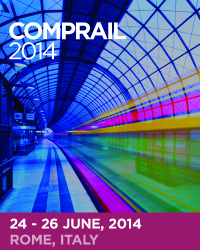Overview
The 14th International Conference on Railway Engineering Design and Optimisation (COMPRAIL 2014) has taken place in Rome, organised by Wessex Institute and sponsored by WIT Transactions on the Built Environment and the International Journal of Sustainable Development and Planning, with the EURAIL magazine as media partner.
The Conference Chairmen were Prof Carlos A Brebbia, from Wessex Institute, UK; Prof Norio Tomii from the Chiba Institute of Technology, Japan; Dr Panos Tzieropoulos from the Ecole Polytechnique Federale de Lausanne, Switzerland; and Dr Jose Manuel Mera of the Polytechnic University of Madrid, Spain.
The conference is part of a very successful series which started in Frankfurt in 1987 and continued in Rome (1990); Washington (1992); Madrid (1994); Berlin (1996); Lisbon (1998); Bologna (2000); Lemnos (2002); Dresden (2004); Prague (2006); Toledo (2008); Beijing (2010) and the New Forest, home of the Wessex Institute in 2012.
The conference aimed to update the use of advanced systems, promoting general awareness throughout the management, design, manufacture and operation of railways and other emerging passenger, freight and transit systems. It emphasised the use of computer systems in advanced railway engineering.
The meeting attracted a substantial number of specialists interested in the development of railways, including managers, consultants, railway engineers, designers of advanced train control systems and computer specialists. It provided a forum for researchers, academics and practitioners involved in railway engineering to present and discuss their latest developments.
The papers were published in Volume 135 of WIT Transactions on the Built Environment series which are widely distributed throughout the world in digital as well as hard copy versions. All conference papers are archived online in the WIT eLibrary (http://library.witpress.com/) where they are immediately and permanently available to the international scientific community.
Conference Topics
The papers were divided into a series of topics and presented at the corresponding session:- Train control systems
- Communications and signalling
- Computer techniques and simulations
- Monitoring and maintenance
- Operations quality
- Planning
- Timetable planning
- Rescheduling
- Energy supply and consumption
- Safety
- Railway vehicle dynamics
Invited Presentations
The Conference started with plenary sessions consisting of talks delivered by invited speakers. They were:- “Some experience and preliminary conclusions from the experimental monitoring of the temperature regime of a subgrade structure”, by Libor Izvolt, University of Zilina, Slovakia.
- “Evaluation of robustness indicators using railway operation simulation”, by Alex Landex, Ramboll, Denmark.
- “Is it worth it? Sketch appraisal of the relevance of proposals for new rail lines”, by Panos Tzieropoulos, Ecole Polytecnique Federale de Lausanne, Switzerland.
- “Modelling a temperature regime of a railway track structure and its comparison with the results of experimental measurements”, by Stanislav Hodas, University of Zilina, Slovakia.
- “Rail vehicles recycling”, by Agnieszka Merkisz-Guranowska, Poznan University of Technology, Poland.
- “Punctuality analysis by the microscopic simulation and visualization of web-based train information system data”, by Yasfumi Ochiai, Odakyu Electric Railway Co, Japan.
- “A 3D simulation approach for railway conflict detection in Traffic Management System layer”, by Jose Manuel Mera, Polytechnic University of Madrid, Spain.
- “Optimisation of the DC railway power feeding system using the embedded simulation technique”, by Ryo Takagi, Kogakuin University, Japan.
- “A holistic approach to analysis the interoperability of the railway system”, by Marianna Jacyna, Warsaw University of Technology, Poland.
Social Occasions
The delegates had ample opportunities for meeting in informal settings, including not only coffee breaks but also the conference lunches and the social events.The International Scientific Advisory Committee (ISAC) of the Conference met over dinner to discuss the conference and improve the Call for Papers in 2016. It was agreed that the title of the meeting could be shortened to Railway Engineering. Several new topics were suggested for inclusion in the call for papers and it was agreed to invite a few more colleagues to join the ISAC.
The ISAC also discussed where to hold COMPRAIL 2016 and a series of locations were proposed, which the conference department of WIT will investigate shortly.
The ISAC meeting offered the possibility to thank the members for their work in reviewing abstracts and papers, as well as promoting the conference.
The conference dinner took place in a Sardinian restaurant renowned for the quality of its cuisine, particularly the fish. The meal started with a series of antipasti of different types and Sardinian specialities. This was followed by pasta and afterwards a fish risotto. The main course was baked fish covered in zucchini, and the dinner ended with a semifreddo, coffee and liqueurs. During the banquet Carlos thanked the delegates for having attended COMPRAIL and stressed the importance of international collaboration.
Conference Proceedings
The proceedings COMPRAIL 2014 – Computers in Railways XIV, 940pp (Print ISBN: 978-1-84564-766-7; eISBN: 978-1-84564-767-4) are available from WIT Press. Orders can be placed on the WIT Press web site at www.witpress.com or by email: marketing@witpress.com, telephone: +44 (0) 238 029 3223 or fax: +44 (0) 238 029 2853.Papers from the conference will also be hosted online at the WIT eLibrary as Volume 135 of WIT Transactions on the Built Environment (ISSN: 1746-4498, Digital ISSN 1743-3509). For more details visit the WIT eLibrary at http://library.witpress.com
